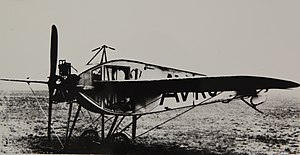The Avro Type F was an early single seat British aircraft from Avro. On 1 May 1912 it became the first aircraft in the world to fly with a completely enclosed cabin for the pilot as an integral part of the design.[1]
| Type F | |
|---|---|
 | |
| General information | |
| Type | Experimental aircraft |
| Manufacturer | A.V.Roe and Company |
| Number built | 1 |
| History | |
| First flight | 1 May 1912 |
Design and development
editIt was a wire-braced mid-wing monoplane with a tailskid undercarriage. The fuselage was teardrop-shaped with flat sides and cellon windows. Oil leakage from the engine had been anticipated to obscure pilot view by coating cabin windows; so two circular windows at the pilot's head level could be opened for the pilot's head to protrude when flying, but their use proved unnecessary. Ingress and egress was via a sheet-aluminum trapdoor in the fuselage top.[1] The cabin was quite cramped, being only 2 ft (60 cm) across at its widest point.
The Type F made a few test flights in mid-1912 until damaged beyond repair in a hard landing on 13 September, after which it was not repaired. Its Viale 35 hp engine is on display at the Science Museum in London; and the rudder was preserved by the Royal Aero Club.[1]
A replica, BAPC.328. is displayed at the Avro Heritage Museum in Woodford, Greater Manchester.
Specifications
editData from [1]
General characteristics
- Crew: one pilot
- Length: 23 ft 0 in (7.01 m)
- Wingspan: 28 ft 0 in (8.53 m)
- Height: 7 ft 6 in (2.29 m)
- Wing area: 158 sq ft (14.7 m2)
- Empty weight: 550 lb (250 kg)
- Gross weight: 800 lb (360 kg)
- Powerplant: 1 × Viale 35 hp 5-cylinder radial , 35 hp (26 kW)
Performance
- Maximum speed: 65 mph (105 km/h, 56 kn)
- Rate of climb: 300 ft/min (1.5 m/s)
References
edit- Taylor, Michael J. H. (1989). Jane's Encyclopedia of Aviation. London: Studio Editions. p. 91.
- World Aircraft Information Files. London: Bright Star Publishing. pp. File 889 Sheet 92–93.
- Avro Type F – British Aircraft Directory